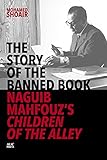The Story of the Banned Book: Naguib Mahfouz's Children of the Alley
Material type: TextPublisher: Cairo; New York: The American University in Cairo Press, 2022Description: 211 p., 26 cmISBN:
TextPublisher: Cairo; New York: The American University in Cairo Press, 2022Description: 211 p., 26 cmISBN: - 9781649030856
| Item type | Current library | Call number | Status | Date due | Barcode | |
|---|---|---|---|---|---|---|
 Books
Books
|
Netherlands-Flemish Institute in Cairo (NVIC) Library Small Library - 0.06 | D 1680 (Browse shelf(Opens below)) | Available | D 1680 |
Browsing Netherlands-Flemish Institute in Cairo (NVIC) Library shelves, Shelving location: Small Library - 0.06 Close shelf browser (Hides shelf browser)
Includes bibliographical references and index.
21 September 1959 -- No Taboos in Literature -- Abd Al-Nasser Asks a Question -- An Angry Message -- How Do Sheikhs Read Literature? -- A Prisoner of Symbolism -- The Moral Educaton of the Citizen -- I Am Not a Philosopher -- The Search for the Manuscript -- The Ultimate Origin -- 13 October 1988 -- 14 October 1994 -- Confronting Sayed Qutb -- Publication by Force Majeure -- 30 August 2006 -- The Waste Land -- The Neglected Commandments -- Appendix: Documents.
"Naguib Mahfouz's novel Children of the Alley has been in the spotlight since it was first published in Egypt in 1959. It has been at times banned and at others allowed, sold sometimes under the counter and sometimes openly on the street, often pirated and only recently legally reprinted. It has inspired anxiety among the secular authorities, rage within the religious right, and a drawing of battles lines among Arab intellectuals and writers. It dogged Mahfouz like a curse throughout the remainder of his career, led to his attempted assassination, and sparked a public debate that continues to this day, even after the author's death in 2006. It is Egypt's iconic novel, in whose mirror millions have seen themselves, their society, and even the universe, some finding truth, others blasphemy. In this award-winning account, Mohamed Shoair traces the story of Mahfouz's novel as a cultural and political object, from its first publication to the present via Mahfouz's award of the Nobel prize for literature in 1988 and the attempt on his life in 1994. He presents the arguments that swirled about the novel and the wide cast of Egyptian institutions and figures, from state actors to secular intellectuals and Islamists, who took part in them. He also contextualizes the interactions among the principal characters, interactions that have done much to shape the country's present. Extensively researched and written in a lucid, accessible style, Naguib Mahfouz and the Story of the Banned Novel is both a gripping work of investigative journalism and a window onto some of the fiercest debates around culture and religion to have taken place in Egyptian society over the past half-century."-- Provided by publisher.
There are no comments on this title.






